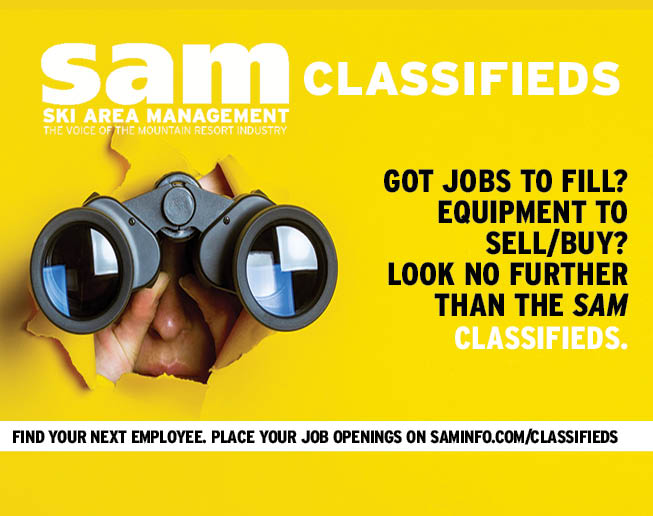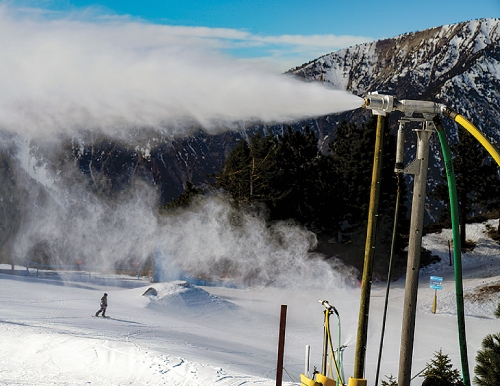Issue
Author
Volume
Page
Subject
Surviving and even thriving in this economy? All it takes is finding a way to scale back your cake but still allow your customers to eat it-and savor every bite they want of it-too. Easy as pie? Not quite. Resorts are looking closely at their staffing to find ways to be lean, mean, but still supreme in the eyes of the customer.
Resorts are taking a variety of measures. Some are layering responsibilities depending on ticket sales each day. Others are using technology to bring in, or send home, staff as needed-or finding ways to function better with tighter staff. These times are forcing resorts to find new ways to function well. And in the long run, that may be just what the industry needs, bull market or bear.
Without doubt, the customer has changed. "Last year," says Chris Nyberg, president of Killington and Pico Mountains, part of Powdr Corp., "we had the same number of people [as the previous year, but] spending differently. They might grab a six-pack at the store and drink it at their condo instead of going to the bar. Those kind of things had an impact."
Here's how areas are responding.
DOUBLE DUTY
Tight staffing often means backroom employees now find themselves on the front lines on peak days. "We've learned to leverage our non-guest staff, such as accountants, to put them on the front line when needed," says Mark Paterson, director of human resources for Snowbird. The area assigns specific employees to specific backup departments, and then asks them all to put in extra days (which, on salary, means more work for the same pay). Paterson himself parks cars, scans tickets and buses tables.
Paterson points out that with the right presentation ("we're all in this to keep our business viable"), it can work. Although, he admits, "you're going to have some push back." Still, by addressing this change before the season starts, you can help staff work out issues such as childcare and other scheduling conflicts, and not take them by surprise. "Most employees got it, in the end," he says. "It was an adjustment, but it was nice for them to know their paycheck was still coming in on time."
Scott Romberger, president and CFO of Snow Time Inc., has his mid-Atlantic resorts look closely at the background of managers before placing them in backup roles, using their history in the business. "People have grown up in the industry in different positions," he says. "They may have worked in the ski school years ago, or the rental shop as a technician. We try to find that out and use it."
Stratton Mountain, Vt., does much the same thing. Management also listens to requests as to which departments staff might want to shift to at peak times. It then gives the managers training in their frontline backup jobs so no one is taken by surprise. The idea is to keep staff confident and comfortable while keeping guest service high.
Resort management consultant Roger McCarthy, who in the past has headed up Breckenridge, Keystone, and Intrawest East, says resorts should be looking at double duty regardless of the economy. In his work with areas, he often sees a resistance to changing structure in upper level management, slowness in getting to more automated (but palatable to the customer) ways of doing things, and a reluctance for some staffers to get out on the front line.
He believes that, in most cases, no administrator or manager is above the basic work that is needed at peak times. In fact, he says, when top execs get out and do the basic work, it can be inspirational and motivating-not just to the staff, but to the customer: "If the CFO gets out and picks up a shovel, it sends a huge message to everyone. It shows what the values of our leaders are, and that elicits a great response. Staff and customers alike realize this is a business that will do all they must to make things great."
While Wachusett president David Crowley also puts managers on the front line when needed, he believes this should be done with care. "You don't want a manager stuck at a cash register where he cannot be flexible in case he is needed immediately in his management job," he says. "We are careful to only put them in places they can easily walk away from should their main job need them immediately."
The Wachusett employee incentive program helps make the job shuffle during peak times palatable. "We have the most basic kind of incentive program there is," he says. "If we make money, you make money. So, even working the parking lot, the employee wants to work hard and make it work well. And guess what? All 100 of our qualified employees made the maximum bonus this past year. So it works."
When to move folks into positions and when to have more staff comes down to tight analysis, says Stratton president and CEO Skye Foulkes. The resort uses all the information it has, from central reservations to scanning to past experience, to figure out when and where folks are needed. Then, for peak times, departments staff as for a normal day, then pull in the reserves for the hour and a half peak time. "Understanding when the volume is coming is key," Foulkes says. "For instance, we know for a fact our Saturday peak is later than our Sunday peak, so we are ready to adapt to that."
He also has a rule that back room management does not need to be at a desk on weekends or holidays; if things pick up fast and someone is working a budget due in two weeks, they're nudged along. "We actually walk around and say, 'hey, what are you doing?' If you have something you want done by Monday morning at 8 a.m. and it's busy out there, you can go out and help and have it done by Monday at 2 p.m. instead."
NO DOUBLE DUTY
Not everyone favors job sharing. Killington's Nyberg is one opponent; he doesn't like the idea of a person who is basically a $20 an hour person doing the job of an $8 an hour person.
Rather, Nyberg's team practices concise staff budgeting, asking each department to look at history and budget out their staff needs hour by hour for the entire season, and then be willing to flex that up and down as changes demand. "It takes real diligence on the part of the manager," he says. On the part of the employees, too.
To manage this system, Killington and Pico have set up a phone line for employees to call in on each day, which puts them on "green" (come in to work), "yellow" (call back in two hours to see), or "red" (stay home) status via a recording the manager leaves. Nyberg says managers were reluctant to do this as first, but found a silver lining in the economic storm: more locals were willing to sign on for part-time, flexible work. And sometimes, when they got the "red" message, they were more relieved than upset. "They'd say, 'oh good, I can sleep in,'" Nyberg says. "This pool of employees really doesn't mind it."
FLEXIBLE SCHEDULING
Flexible scheduling is, in fact, at least as popular a tactic as job sharing. At Hyland Ski and Snowboard Area in Minnesota, the staff swells from a mere 11 full-timers to nearly 500 workers on peak days. That requires a clear and focused organizational chart and a whippersnapper way to communicate with all those extra workers should weather help or hinder a day's skier count.
Since many of its part-time employees are younger and hipper than some of us, Hyland has adopted a new way to notify employees when to come in or stay home: a little thing called texting.
"It's the only way kids will communicate now anyway," says Fred Seymour, senior manager of alpine services. "So we can text out what coverage we need by shifts, and we can break down who we send the texts to by department." So, basically, what once took many phone calls, manhours and land lines now takes a few pushes of the thumb, and works well. Hyland also sends out texts in the case of sudden closings, and is finding it works well as a communication device. And on the cheap at that.
Similarly, Crowley says Wachusett has enlisted the help of an internal website (intranet) that employees can access to know exactly what kind of staffing is going to be needed at each time of the day (and night, since their night skiing is big, too), and when they are and are not needed. Employees are required to log on regularly (a simple task in today's world) and see what level their department is at, then either come in, check back or take the time off.
Crowley points out that this works well for them because most of their employees live locally and can be flexible. "We have college kids, construction workers looking for extra cash, the type of employee who is okay with adapting with our needs each day," he notes.
EQUITABLE PAYCUTS
The big guys have some things figured out as well. Blaise Carrig, co-president of the Vail Resorts Mountain Division, says VR has had to become lean and mean, too. But, he says, VR did so while keeping its core values intact: culture, core product and the "gold standard in operations."
Culture includes the mood, confidence and feeling of ownership that employees soak in every day. Case in point: when VR realized it had to trim staffing costs, the leadership thought long and hard about increasing hours and cutting positions. It decided instead on a stepped program of pay cuts, with the highest-level managers taking the deepest percentage cuts (10 percent), and the lowest-paid employees taking the smallest percentage cut (two percent).
"The response was fantastic," Carrig says. "We trimmed out budget, didn't lose positions, kept our service level up, and held onto the respect and loyalty of our staff."
As with some other areas, VR resorts keep close tabs on the guest experience, to make sure there's sufficient staff on hand to provide the high level of service guests expect. The resort's scanning system allows managers to know, minute by minute, exactly how many people are on each mountain. Some staff monitor via computer, and every single senior executive is kept updated via Blackberry. "So we have stopgaps we can put into place should the numbers change remarkably," he says. It's all a bit addictive to watch, he admits, but that technology has given VR a way to staff lean but keep customers happy.
STAFF CUTS
Last and, we hope, least, some areas have found it possible to cut staff. Where do you look? There are some specialist positions, McCarthy says, where it may be time to outsource that job-hard as that may be for a resort to accept. One position McCarthy sees as oft easy to hire out is the full-time resort planner. "I mean," he says, "What are you planning all the time?"
BACK TO THE BOTTOM LINE
In the end, most managers believe tighter budgeting of staff as well as putting management on the front line from time to time will benefit business in the long run. "Getting closer to the guest can only mean good things," Seymour says. "Firsthand information from the guest is so much more valuable than things that come up through the layers. I think, even if a resort's been forced into this, it's going to really help them in the long run."
"That involvement," says McCarthy, "has enormous impact on who we are and why we are here. That kind of information will only lead to happier customers. And in the end, that's what we all want."
| From the top: Blaise Carrig, Vail Resorts; David Crowley, Wachusett Mountain; and Sky Foulkes, Stratton, all get creative when it comes to staffing. | |
| Some of these area managers can be found parking cars on a busy day. Can you spot the exception? From the top: Roger McCarthy, consultant; Chris Nyberg, Killington; Mark Paterson, Snowbird; and Fred Seymour, Hyland Hills. | |
SAMMY GUEST EDITOR'S TAKE
Managing staff is the ultimate chess game; we move our staff around to handle peak needs, even as the weather, guest behaviors, the economy, and our very own employees can sometimes act as obstacles that prevent us from delivering a superior experience.
We pay our managers well to do just that: manage. It is wasteful to have highly compensated people working lower-paid positions. However, the culture at our areas should be such that our team works together to exceed the customer's expectation, no matter the job title. Anything we can do to build a feeling of ownership in our employees will pay off in spades when it comes to customer service.
Flexible scheduling is important to us day areas. Our part-time staff tends to be larger, so that we can have volume in our ranks on the busy weekends, and spread them out through the slower weekdays-it is no less tricky to staff properly for weekdays.
Communication with the staff is key at all times. The phone-in, text, and website systems mentioned are all great ideas. At Perfect North Slopes, we schedule with WhenToWork.com, which provides efficiencies for both managers and employees alike. Whatever system is used, it should be a tool for our managers, not an extra distraction or source of frustration.
For anyone looking to trim or cut positions or pay, consider using in-house incentives. We have given few raises as we weather the minimum wage increase, but have found ways to compensate longer-term staff while boosting morale. One example: a High Five card, a cash credit that can cover a staff lunch, goes a long way when given with a pat on the back on those peak days.
Hats off to those willing to take one for the team and work the front lines on "those days." As Fred Seymour says, it can only result in good things.
-Jonathan Davis \















